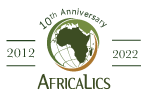Dr. Jumoke Oladele and Dr. Oluseye Jegede
Nigerialics Activity Committee
Webinar’s highlights
About the speaker: This first Edition of NigeriaLics Network Webinar was held on 25th of June 2020. The speaker was Prof. Mammo Muchie who holds the South African Research Chair in Innovation Studies at the Management Sciences, Tshwane University of Technology, South Africa. He has a keen interest on the challenges of building African innovation systems. He serves in the AfricaLics Scientific Board.
Introduction
The speaker reflected on the COVID-19 pandemic and its impact on research productivity with a focus on appropriate technology. He invited conversation within African continent reflecting on the following main challenges that he perceives to be stumbling blocks to making the most of the pandemic within the continent:
- unending poverty, inequality and unemployment;
- world demographic explosion and climate change with informal and agriculture economy remaining still largely where most of the people live;
- surveillance capitalism which is connected to the digital age of the fourth industrial revolution.
These challenges call for Africa to re-think, re-frame, re-do, re-transform, re-perform and reform. He argued that re-thinking innovation and development; and re-innovating innovation and development bring about re-defining innovation. This consequently leads to a new hybrid synthesis of imagination and knowledge that is needed to bring about the following:
- Build new synergy between development and innovation system;
- Synergize informal with formal economy, indigenous with modern all knowledge and not merely prioritize the economic profit gain variable by excluding the social and environmental gains to undertake and validate both innovation and development achievements embedded in the African context;
- Generate problem-based knowledge creation by applying all the disciplines using the unity of knowledge. A unified conceptual framing and theories linking innovation system with tangible and measurable developmental comprehensive outcomes is therefore germane;
- Invent change urgently for Africa to contextually anchor new models that synthesises innovation with an African integrated and sustainable development innovation system.
Prof. Muchie reiterated the need for Africa to construct an integrated, networked and unified sustainable development innovation system path by coming together rather than by going alone facing the prisoners’ dilemma being caught within the boundaries of each of the 55 states. Therefore, a new innovative approach to handle the rich resources and how to create both production applying high technology and innovation and creating consumption by making the African production to consumption value chain is much needed to address now more than at any time as the global value chain is changing dramatically with the 4th Industrial Revolution (4IR).
A call for a paradigm shift: Prof Muchie’s appeal to the African continent
KEY HIGHLIGHT FROM THE WEBINAR: There is need for Africa to combine knowledge with innovation through a unique learning culture thereby a total innovating to solving the peculiar needs on the continent.
Africa now than ever before must embark on the path innovating innovations by creating the inventive, transformative, green and smart, integrated, networked and unified industrial structural sustainable development to deal with and respond to the current 4IR.
Recommendations
- Recommends a paradigm shift towards making technology appropriate to solve Africa’s problems. While what to produce, where to produce and how to add value with innovation and entrepreneurship should be the priority of life for all to transform Africa, a new innovative approach to value and use all the resources to create production by applying high technology and innovation is long overdue.
- There is need to create opportunity from the current economic danger that created COVID-19 by including social wellbeing, health and environmental gain and knowledge gain. This call for applying digital transformation to create social technology, social innovation, and social enterprises; leveraging on the 4IR for social innovation systems to be innovated.
- Africa needs to re-frame the conception of unity knowledge. This requires knowing how to engage in smart, inclusive, sustainable and integrated African structural transformation by a well-crafted and managed synthesis of the economic, social, cultural, environmental and political processes as well as how to be far when near the global economy and how to be near when far from it. This is important because Africa was a loser in the 1st, 2nd and 3rd Industrial Revolutions and must not maintain this trend in the 4IR.
To leverage on the 4IR, Africa MUST Catch up and Leapfrog by leveraging on:
- the Knowledge economy which is borderless
- combining agriculture, industry and service economies
- combining the experience, creative and imagination economies
- Artificial Intelligence (AI), robotics, Internet of Things (IoT), blockchain and big data the knowledge economy global value chain among others.
About NigeriaLics:
NigeriaLics Network is AfricaLics Hub in Nigeria and the acronym for the Nigerian Network for Economics of Learning, Innovation, and Competence Building Systems. The Network is an emerging group designed to bring together scholars, researchers and policy analysts who study development, innovation, learning and competence building Systems in a Nigerian context, drawing on African and global context. Carefully designed to be in tandem with AfricaLics objectives and vision, NigeriaLics’s perspective is systemic, socio-economic, institutional, evolutionary, and policy oriented. The overall vision of NigeriaLics is to facilitate the production and use of high-quality research in the field of innovation and development with a view to promote inclusive and sustainable development in Nigeria.
